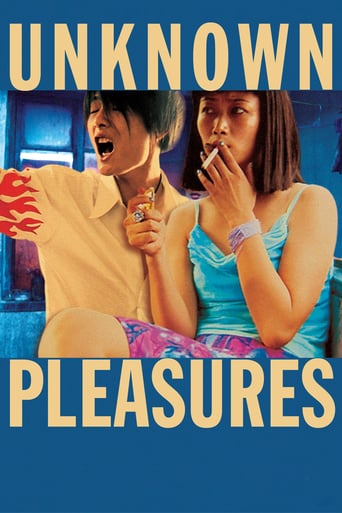mdkiem
A poem to the millions of young men in China who are tempted and beguiled by the promises of a rapidly economically advancing society but are unable to turn those promises into reality. There are new roads in all directions but your scooter won't get you anywhere. The lyrics of the song perfectly fit the hopes and frustrations of the young men. BTW, the characters in this movie are not so much influenced by American culture as they are by the consumerism and globalization of the Chinese economy. "Are you having fun?"
Robert_Woodward
Unknown Pleasures portrays Bin Bin and Xiao Ji, two young Chinese men living in the city of Datong, several hundred miles west of Beijing. Theirs is a city in transition; crowded streets and apartment blocks back onto building sites, weird landscapes of debris and raw materials. The growing commercialisation of Chinese society is readily apparent; in an early scene the duo attend a lurid road show promotion for alcoholic drinks. The television news that punctuates the film shows the changes and conflicts in China and the effect these are having across the world, from the controversial US spy plane crash to the award of the Olympic games for 2008.The two young protagonists are outsiders in their changing city. Bin Bin, newly unemployed, lives with his mother. Unwilling – then unable – to find new employment, he becomes increasingly despondent. His relationship with his girlfriend, Yuan Yuan, is lived out in front of a television screen: they rarely make eye contact. The cultural void in his life feels remarkably Western. Xiao Ji works for his father's garage business. Whilst Bin Bin becomes increasingly downcast, Xiao Ji dreamily pursues Xiao Wu, a dancer with the aforementioned road show, risking the anger of her volatile boyfriend.The overlapping stories of the two friends develop a common theme of loneliness and yearning on the fringes of a rapidly changing society. The sense of despair and malaise in their lives is powerfully conveyed, but the increasing aimlessness of their activities makes for slow and often difficult viewing. The final third of the film is particularly slow, with many drawn-out scenes. Despite this slackening of the pace, an unexpected twist at the end rams home the film's message that, along with the new freedoms in China, there is disenchantment with the new shape of society.
J. M. Verville
The story begins with an outline of the mundaneness of the lives and future of two Chinese youths, and progresses into showing in a short amount of time just how much their lives and personal situations change; dealing with unemployment, troublesome love lives and coming into their own a beautiful story unfolds. With allusions to the film Pulp Fiction throughout and a recurring song that touches the heart, with solid performances by all of the actors (especially Zhao Tao) it was a very good film. My only criticism is at times the story can be slow, though overall the story is far more interesting than one sees in normal cinema. The film was particularly strong in the simplistic nature of the film-making itself, with nothing ever over-the-top. It aimed to tell the situation as how it really is, and to tell life like how it really is, not some sort of Hollywoodized conception of life. The artistic reflection that was put into the film shows a great and amazing depth to it that is often hard to find.
Overall, a great film my Jia Zhang-ke. The feelings of hopelessness that he is able to make oneself feel make this a must-see for anyone who enjoys sad cinema and existentialism, and is interested in the struggles of youth and issues of modernization and globalization.
George Parker
The title of this film is a fitting description of its entertainment value. The story is a kind of lame social statement about creeping Westernism in China as viewed from the slums. However, the story is so trite, so cliche, so thin, and something we've already been through with Japan in a slew of films, it can't overcome the perfectly awful production value, poor quality of execution, and time wasting filler. The litnay of deficits is too long for this forum. But, for those who may want to give "Unknown Pleasures" a try on DVD, be advised that the DVD I watched had no CC and the default setting for subtitles was *** (three asterisks) and "off". English language subtitles did appear, however, after switching to "on" even through the *** generally means no subtitles available. FYI. (C-)


